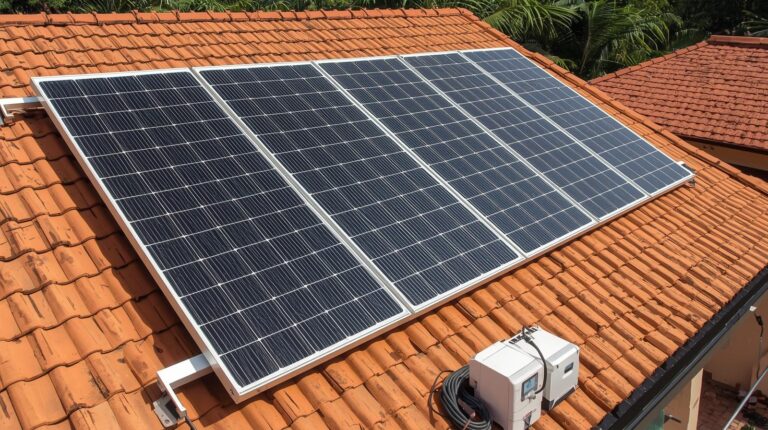Are you in the dark about solar power? Don’t worry, in this article, we’ll shed light on some common solar power myths and debunk the misconceptions. From the belief that it’s too expensive to the notion that it can’t generate enough electricity, we’ll provide you with 11 essential tips to help you separate fact from fiction.
Get ready to embrace the power of the sun and join the solar revolution!
Key Takeaways
- Solar power is becoming increasingly affordable and cost-effective, thanks to the decrease in the cost of solar panels and various financing options.
- Solar panels can generate electricity even on cloudy days due to their ability to capture diffused sunlight and advanced technologies that minimize the impact of shading.
- Advancements in technology have greatly improved the reliability and efficiency of solar power systems, making them a reliable part of an overall energy strategy.
- Solar power can generate sufficient electricity when considering grid integration, technological advancements, scalability, and storage solutions.
Solar Power Is Too Expensive
Don’t let the misconception fool you – solar power isn’t too expensive. In fact, it’s becoming increasingly affordable and cost-effective.
The initial investment may seem high, but when you consider the long-term benefits, it becomes clear that solar energy is a wise choice.
Solar power affordability is due to several factors. First, the cost of solar panels has significantly decreased over the years. Additionally, there are various financing options available, such as leasing or power purchase agreements, which make it more accessible to homeowners. Furthermore, government incentives and tax credits can significantly reduce the upfront costs.
When you factor in the savings on your monthly electricity bills and the potential for selling excess energy back to the grid, solar power proves to be a financially sound investment in the long run.
Solar Panels Don’t Work on Cloudy Days
Solar panels continue to generate electricity on cloudy days. Contrary to popular belief, solar panels can still produce power even when the sun hides behind clouds. While they may not generate as much electricity as on a sunny day, they still offer a significant contribution to your energy needs.
To understand how solar panels work on cloudy days, let’s take a closer look at their efficiency and the impact of shading. Solar panel efficiency refers to the ability of the panels to convert sunlight into electricity. While it’s true that cloud cover reduces the amount of sunlight reaching the panels, modern solar panels are designed to work efficiently even in low-light conditions. They can still capture diffused sunlight and convert it into usable energy.
Shading can have a more significant impact on solar panel efficiency than cloudy weather. If even a small portion of the panel is shaded, it can affect the entire system’s performance. This is because solar panels are connected in series, and shading one panel can reduce the output of the entire string. However, with advanced technologies like bypass diodes, we can minimize the impact of shading. Bypass diodes allow the electricity to bypass the shaded portion, ensuring that the other panels continue to function optimally.
Solar Power Is Unreliable
While it’s a common misconception, relying on solar power alone for your energy needs is unreliable. However, advancements in technology have greatly improved the efficiency of solar power systems, making them more reliable than ever before.
Solar panels are now able to convert sunlight into electricity with higher efficiency rates, meaning that you can generate more power from a smaller number of panels. Additionally, the development of solar power storage options, such as batteries, allows you to store excess energy generated during the day for use at night or during cloudy periods.
This means that even when the sun isn’t shining, you can still rely on solar power to meet your energy needs. So, while it may not be the sole solution, solar power can play a reliable role in your overall energy strategy.
Solar Power Can’t Generate Enough Electricity
To ensure sufficient electricity generation, it’s important to consider the capacity of your solar power system. While it’s true that solar power alone may not be able to meet all your energy needs, it’s a misconception that it can’t generate enough electricity. Here are some facts to debunk this myth:
- Grid integration: You can connect solar power systems to the grid, allowing you to draw electricity when your solar panels aren’t producing enough. This ensures a constant and reliable power supply.
- Technological advancements: The efficiency of solar panels has significantly improved over the years, allowing them to generate more electricity from the same amount of sunlight.
- Scalability: You can increase the capacity of your solar power system by adding more panels, enabling it to generate more electricity as your energy requirements grow.
- Storage solutions: With the advent of advanced battery technologies, excess electricity generated during the day can be stored for use during the night or on cloudy days.
Solar Panels Require Too Much Maintenance
Maintaining solar panels requires regular cleaning and inspection. Contrary to popular belief, solar panels don’t require excessive maintenance. In fact, they are low-maintenance and reliable.
The only regular maintenance required is cleaning the panels to ensure optimal performance. You can do this with a soft cloth and mild detergent. Inspecting the panels periodically is also important to identify any potential issues such as loose connections or damage.
When it comes to maintenance costs, solar panels are cost-effective in the long run. While there may be some initial installation costs, the lifespan of solar panels is typically 25-30 years. During this time, the savings on electricity bills far outweigh any maintenance costs.
Conclusion
So now you know the truth about solar power. It’s not too expensive, it works on cloudy days, and it’s reliable.
Solar power can generate enough electricity to power your home, and the maintenance required for solar panels is actually minimal. Don’t let these myths hold you back from embracing this clean and sustainable energy source.
Start reaping the benefits of solar power today and contribute to a greener future.



